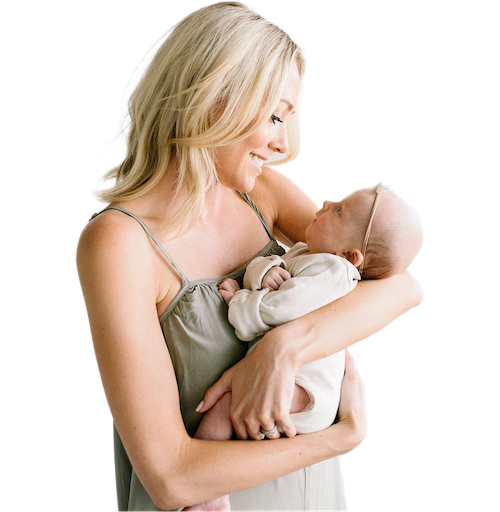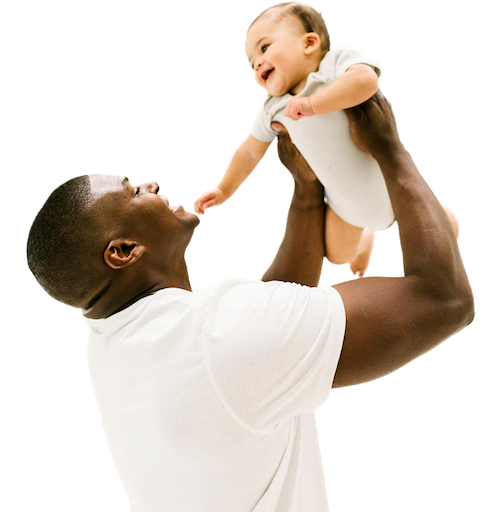At eight months old, your baby is making developmental and cognitive strides that can impact sleep. Let me share with you common questions I get about eight month old nap schedules, wake windows, sleep regressions, and more.

The 5–24 Month Collection
stars ( reviews)
If your 8-month-old's naps and nights feel unpredictable, my 5-24 Month Collection offers a step-by-step comprehensive plan to help your little one become a great little sleeper. Let me help you bring the calm back to naptime and bedtime with my step-by-step plan to achieve restful and restorative sleep for nights and naps.
Learn MoreWhat are suggested wake windows for an 8 month old? anchor
Wake windows for an eight month old range from 2.5 to 3.5 hours. Your baby’s wake windows will depend on:
Age – a new eight month old will be on the shorter end of this range, while an almost nine month old will be on this longer end of the range.
Activity level – if most of your baby’s awake time was spent in a car, stroller, or carrier, they may need a bit of time before nap or bedtime to work out some energy.
Time of day – wake windows generally get longer as the day goes on, so you’ll probably find your eight month old can stay awake longer in the afternoon and evening.
Individual development – every baby is different, so some eight month olds will tolerate a longer wake window (3-3.5 hours) while others will need one a bit shorter (2.5-3 hours).
How do I set up a daily schedule for my 8 month old?anchor
Follow these general guidelines to set up your daily routine:
About 2.5-3 hours after wake time = Nap 1
About 3 hours after the end of Nap 1 = Nap 2
About 3-3.5 hours after the end of Nap 2 = Bedtime
8 Month Sleep Schedule Guidelinesanchor
Every baby is unique and your little one’s day will depend on when your baby wakes, how long your baby naps, and individual cues. These age-appropriate guidelines are not intended to be a rigid schedule, simply a guide for setting up a flexible routine.

Text version of 8 month Sleep Guidelines table
| Daytime Feedings: | Every 2.5-3.5 hours |
|---|---|
| Goal Daytime Sleep: | 2.5-3.5 hours |
| Sweet Spot Bedtime: | 7:00-8:00 pm |
| Number of Naps: | 2 |
| Wake Windows: | 2.5-3.5 hours |
For more details on these recommendations, keep reading.
What is a sample daily schedule for an 8 month old?anchor
Schedules for 8 month olds are flexible and responsive to each baby’s needs and cues throughout the day. A baby’s nap lengths, wake windows, and feedings all impact an 8 month old’s day and it’s possible to have variations from day to day. Here is one example of how an 8 month old’s schedule may play out:

Text version of 8 Month Old Sample Sleep Schedule table
| Time | Activity |
|---|---|
| 6:50 am | Wake |
| 7:00 am | Feed (breast/bottle) |
| 9:30 am | Feed (breast/bottle) |
| 9:40-11:15 am | Nap 1 |
| 12:30 pm | Feed (breast/bottle) |
| 1:00 pm | Solids |
| 2:15-4:00 pm | Nap 2 |
| 4:00 pm | Feed (breast/bottle) |
| 5:30 pm | Solids |
| 7:00 pm | Feed (breast/bottle) |
| 7:30 pm | Bedtime |
Parents: Understand, this schedule is just a sample. This is just how one parent was responsive to their baby’s hunger and sleepy cues, while maintaining age appropriate naps and wake windows.
How many naps should an 8 month old baby take?anchor
Around eight months, most babies have transitioned to 2 naps. If your baby is still taking 3 naps, make sure you're watching for signs it's time to transition to 2 naps.
Bonus tip for Daycare Families: Even if your little one has transitioned to 2 naps at home, sometimes your eight month old may need a 15-30 minute catnap to make it to bedtime on daycare days. Don’t let the catnap go longer than 30 minutes. We want to make sure your baby is tired enough at bedtime to sleep well.
How long should my 8 month old nap? How much sleep does an 8 month old need? anchor
At eight months old, you'll want to aim for:
2.5-3.5 hours of daytime sleep divided between 2 naps
Wake windows around 2.5-3.5 hours
10-12 hours of night sleep
We also want to be sure not to let any one nap go longer than 2 hours. Capping a nap at 2 hours supports good sleep by:
Allowing for sufficient active awake time.
Providing time for adequate feedings during the day to help your eight month old sleep through the night.
Helping you maintain a bedtime between 7:00-8:00 pm.
If you’re struggling to get at least 2.5 hours of daytime sleep, my Conquering Naps class can help.
Why is my 8 month old refusing to nap? Why are naps such a struggle?anchor
If naps have consistently been a struggle, start by:
Check out these potential causes and solutions for short naps.
Then, if your eight month old is still struggling with naps, know that my Conquering Naps class will provide you with the tools you need and a step-by-step plan to establish consistent daytime sleep.
If your eight month old is suddenly fighting naps, consider:
Is your baby learning a new skill? anchor
As babies learn new skills, sleep can get a bit disrupted. If you notice signs of a new skill (like crawling or scooting), give your baby lots of floor time to practice. The chance to try out their new skills during awake time makes the skill less exciting during sleep time.
Is your baby still taking 3 naps? anchor
As babies get older, they need more awake time before they're ready for a nap. If your eight month old is still taking 3 naps and struggling to fall asleep, it may be time to transition from 3 to 2 naps.
Is your baby becoming upset when you’re out of sight?anchor
Your baby may be experiencing separation anxiety. Many babies have a rise in separation anxiety between 8 and 10 months as they develop a greater understanding of object permanence.
Is your baby pulling up in the crib? anchor
If your eight month old is standing in their crib, consider adding a sleep sack and make sure the crib is in the lowest position. Also, during awake time, give your baby opportunities to practice pulling up and sitting down.
What time should my 8 month old stop napping for the day?anchor
We want the last nap to end by 4:30-5:00 p.m. Most eight month olds will need a 3-3.5 hour wake window between the last nap and bedtime. By ending the last nap by 5 p.m., we’ll maintain a bedtime before 8 p.m..
What are some 8 month old milestones? anchor
At eight months old, your baby may:
Work on crawling and/or getting up on all fours
Rock back and forth on all fours
Babble vowels and consonants together
Babble with inflection
Pick up objects with a pincer grasp
Bang toys together
Start to understand basic words (e.g. no, hi, bye)
Keep in mind, milestones are based on ranges, so some babies reach them earlier or later than other babies. If you have any concerns about your baby’s development, speak with your pediatrician.
What are some activities to do with my 8 month old baby? anchor
There are lots of fun and engaging activities and toys for your eight month old. Here are some ideas:
Practice pulling up and standing while supported with an activity center.
Practice crawling by placing objects slightly out of reach, like a ball or push car.
Explore different textures around the house, like soft blankets or a brush. You can even use foods (like cheerios and yogurt) or a water table, which helps encourage pulling up and standing.
Use touch and feel books to explore textures, pictures, and words.
Practice waving in the mirror or go outside and wave at people and cars passing by to help your baby learn “Hi” and “Bye” (This is also a great way to stretch a wake window!).
I have some favorite toys for eight month olds here.
What is a good bedtime for an 8 month old? anchor
For an eight month old, the sweet spot for bedtime is between 7:00-8:00 pm. This time is the best for helping your baby fall asleep and stay asleep through the night. Babies who go to bed past 8:00 pm. typically experience more false start bedtimes, night wakings, and early morning wakings.
There may be some times you’ll need to move bedtime earlier than 7:00 pm. Consider an earlier bedtime if you experience any of the following:
All naps for the day are short and/or disrupted.
The last nap of the day is short or refused.
Your baby is struggling to make it to 7:00 pm and has had at least a 2.5-hour wake window.
Your baby is consistently waking before 6:00 am.
Should my 8 month old be waking up at night to eat? When do babies sleep through the night?anchor
Every baby is unique, and there’s no specific age when babies magically start sleeping through the night. Most babies can sleep 10-12 hours overnight without a feeding at eight months old. But it’s always best to discuss night feedings with your pediatrician.
If you’re thinking about weaning night feedings (or even if you want to maintain a feeding in the night) for your eight month old, I can help. The 5–24 Month Collection will help you create a gentle and gradual approach to weaning night feedings and reaching your sleep goals.
How do I stop my 8 month old from waking in the night? anchor
If night wakings are a sudden change, it’s important to rule out any physical concerns – like sickness or teething.
If these aren’t an issue, we can examine other reasons your baby struggles to sleep through the night. A few of the more common reasons are:
Being ready for increased wake windows
Needing to drop a nap/too much daytime sleep
Your eight month old may also be struggling because they don’t have the skills needed to sleep independently. Not sure where to start? The 5–24 Month Collection gives you a step-by-step plan to follow. It's a balanced, holistic approach to teaching your little one to sleep through the night while still remaining emotionally connected.
How much should an 8 month old eat? anchor
Caloric needs vary from baby to baby. The best indicator that babies are on track with eating is that they're following their growth curve.
Here are some guidelines for feeding your eight month old:
Always respond to your baby’s hunger cues by offering the breast or bottle every 2.5-3.5 hours during the day on a flexible feeding schedule.
Offer solids 2-3 times per day, aiming for 30-90 minutes after breast/bottle feedings.
Wondering how starting solids will impact your baby’s sleep? See my blog to learn Do Solids Help Babies Sleep?
Important Note: If you have concerns about whether your baby is getting enough calories during the day, please discuss this with your pediatrician.
Is there an 8 month sleep regression? anchor
Yes, there is! At this age, babies experience an increase in physical abilities, mobility, and emotional and cognitive development – so we may see changes or disruptions to sleep. This is often called the 8-10 month sleep regression.
You may also find:
Your baby is more distracted during feedings as they explore their world. Try minimizing stimulation to encourage your baby to take in enough daytime calories, which are so important for night sleep.
Your baby is learning object permanence and experiencing separation anxiety.
Should I sleep train at 8 months old? anchor
At eight months old, you may decide sleep training is the best option if your baby isn’t sleeping through the night. It’s never too late to help your baby get better sleep!
My 5–24 Month Collection walks you step-by-step through a completely customizable and holistic sleep training plan to help your baby sleep independently for 10-12 hours each night. These classes will give you the tools to have a great little sleeper through the first two years of life for days, nights, and every bump along the way.
Still have a 7 month old? Check out 7 month sleep schedules. Already have a 9 month old? I've got you covered with my 9 month sleep schedules.
References
7 Sources
American Academy of Pediatrics. (2022). Sleep-Related Infant Deaths: Updated 2022 Recommendations for Reducing Infant Deaths in the Sleep Environment
vBrown and Harries. (2015). Infant Sleep and Night Feeding Patterns During Later Infancy: Association with Breastfeeding Frequency, Daytime Complementary Food Intake, and Infant Weight
Mindell et. al. (2008). Developmental aspects of sleep hygiene: Findings from the 2004 National Sleep Foundation Sleep in America Poll
Mindell and Williamson. (2017). Benefits of a bedtime routine in young children: Sleep, development, and beyond
Paruthi et. al. (2016). Recommended Amount of Sleep for Pediatric Populations: A Consensus Statement of the American Academy of Sleep Medicine
Scher and Cohen. (2015). Sleep as a Mirror of Developmental Transitions in Infancy: The Case of Crawling
Tham, Schneider, and Broekman. (2017). Infant sleep and its relation with cognition and growth: a narrative review
Keep in mind that the information and content on this blog is for informational purposes and should not be considered medical advice. If you have questions about your child, please reach out to your doctor.








